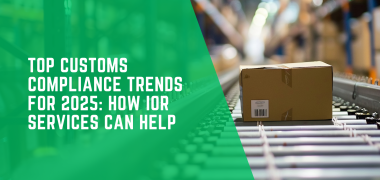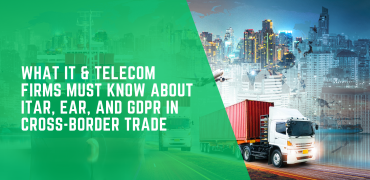In an increasingly globalized and interconnected world, the role of customs compliance has never been more crucial. For IT and tech companies operating across borders, navigating the complexities of customs regulations is not just a logistical necessity but a critical factor in maintaining operational efficiency and compliance. As we move into 2025, several key trends are reshaping the customs landscape, and Importer of Record (IOR) services are emerging as vital allies in navigating these changes.
The Evolving Landscape of Customs Compliance
Customs regulations have always been dynamic, but the rapid pace of technological advancements, geopolitical shifts, and evolving trade agreements is bringing unprecedented changes to the compliance landscape. The following trends are expected to define customs compliance in 2025:
1. Digital Transformation in Customs Processes
Governments and customs authorities worldwide are increasingly adopting digital technologies to streamline processes, improve transparency, and reduce delays. Initiatives like blockchain for secure documentation, AI for risk assessment, and electronic customs declarations are becoming standard.
How IOR Services Help: IOR providers are well-versed in the latest digital tools and platforms, ensuring accurate and timely submission of digital customs documentation. They also help companies integrate their systems with national customs portals, minimizing the risk of non-compliance due to technical issues.
2. Heightened Focus on Data Accuracy and Security
With the rise of digital customs processes comes an increased emphasis on data accuracy and cybersecurity. Errors in customs documentation or breaches of sensitive data can lead to significant penalties and reputational damage.
How IOR Services Help: IOR providers act as custodians of your import data, ensuring meticulous preparation and submission of documentation. Their expertise reduces the likelihood of errors, while their robust security protocols protect sensitive information from breaches.
3. Geopolitical Tensions and Trade Policy Shifts
Geopolitical factors, including trade wars and evolving trade agreements, continue to impact global supply chains. Sanctions, tariffs, and sudden regulatory changes can disrupt operations if businesses are unprepared.
How IOR Services Help: IOR providers stay updated on geopolitical developments and changing trade policies, offering guidance to ensure compliance with new regulations. They also help businesses adjust their supply chains to minimize disruption.
4. Sustainability and Green Trade Initiatives
Sustainability is becoming a priority in global trade, with governments introducing eco-friendly regulations, such as carbon border taxes and green shipping standards. Compliance with these regulations is essential for businesses to maintain market access.
How IOR Services Help: IOR services guide companies in adhering to sustainability-related customs requirements. This includes proper documentation for eco-friendly certifications and ensuring compliance with environmental regulations.
5. Increased Scrutiny on Tech and IT Imports
The tech industry faces unique challenges, including restrictions on importing dual-use goods, compliance with intellectual property regulations, and adherence to cybersecurity standards. Governments are tightening controls on tech imports to protect national security and intellectual property.
How IOR Services Help: Specialized IOR providers for IT and tech companies ensure compliance with industry-specific regulations, such as WEEE (Waste Electrical and Electronic Equipment) and RoHS (Restriction of Hazardous Substances). They also assist in navigating export control restrictions and licensing requirements.
The Role of IOR Services in Addressing Compliance Challenges
IOR services act as a strategic partner for businesses, taking on the legal and regulatory responsibilities of importing goods into a foreign country. This allows companies to focus on their core operations while ensuring compliance with customs regulations. Here’s how IOR services can address specific compliance challenges in 2025:
1. Ensuring Compliance Across Multiple Jurisdictions
Operating in multiple countries means dealing with diverse and often complex customs regulations. Staying compliant requires a deep understanding of local laws and procedures.
IOR Advantage: IOR providers have in-depth knowledge of regional customs requirements, ensuring smooth imports across different jurisdictions. They help standardize processes, reducing inconsistencies and delays.
2. Streamlining Documentation and Reporting
Customs documentation can be a time-consuming and error-prone process. Missing or inaccurate information can lead to delays, fines, or even confiscation of goods.
IOR Advantage: IOR providers handle all documentation requirements, from commercial invoices and packing lists to certificates of origin and import licenses. Their expertise ensures accuracy and timely submission.
3. Managing Tariffs and Duties
Understanding and calculating tariffs, duties, and taxes is critical for cost management. Incorrect tariff classifications can result in overpayment or penalties.
IOR Advantage: IOR services ensure accurate tariff classification and advise on strategies to minimize duties, such as leveraging free trade agreements or duty drawback programs.
4. Navigating Compliance for Restricted Goods
IT and tech products often fall under restricted or controlled goods categories due to their potential dual-use applications. Importing such goods requires additional licensing and compliance measures.
IOR Advantage: IOR providers assist in obtaining the necessary permits and licenses for restricted goods. They also ensure adherence to specific regulations, such as export controls and cybersecurity standards.
5. Handling Customs Audits and Inspections
Customs authorities conduct routine audits and inspections to verify compliance. Being unprepared can lead to delays, penalties, or even loss of business.
IOR Advantage: IOR providers maintain detailed records and documentation to support customs audits. Their proactive approach ensures businesses are always prepared for inspections.
Best Practices for Leveraging IOR Services in 2025
To maximize the benefits of IOR services, businesses should adopt the following best practices:
- Choose a Specialized IOR Provider: Opt for an IOR provider with expertise in your industry and target markets. For IT and tech companies, this means selecting a provider familiar with industry-specific regulations and challenges.
- Integrate IOR Services into Your Supply Chain: Treat IOR providers as an extension of your logistics team. Regular communication and collaboration will ensure alignment and efficiency.
- Stay Proactive with Compliance Updates: Work closely with your IOR provider to stay informed about regulatory changes and their potential impact on your operations.
- Invest in Technology: Leverage digital tools and platforms recommended by your IOR provider to streamline processes and improve visibility into your supply chain.
- Focus on Sustainability: Collaborate with your IOR provider to ensure compliance with green trade initiatives and demonstrate your commitment to sustainability.
Conclusion
As customs compliance becomes more complex and critical in 2025, IT and tech companies must stay ahead of the curve to ensure seamless global operations. IOR services offer a comprehensive solution to navigating the challenges of cross-border trade, providing expertise, efficiency, and peace of mind. By partnering with the right IOR provider and embracing the latest trends in customs compliance, businesses can focus on innovation and growth while leaving the complexities of international trade in capable hands.
In a world where compliance is key to staying competitive, IOR services are not just an operational necessity but a strategic advantage. By addressing the emerging trends and challenges of 2025, IOR providers empower businesses to thrive in a rapidly evolving global market.




